Richard Armitage + John Porter status games: A glimpse at Strike Back: Origins
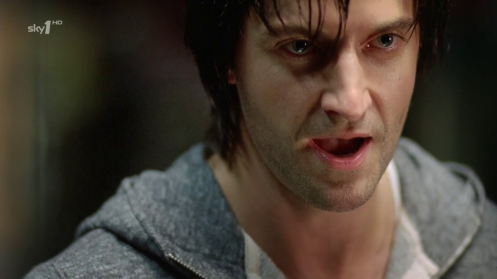
No nape curls — it was definitely a wig. Richard Armitage as John Porter in Strike Back: Origins (Strike Back 1.1). My cap.
***
It seems fitting, on the evening of John Porter’s (re-)materialization on Cinemaxx, to write a little more about the striking qualities of Richard Armitage’s work in Strike Back (now Strike Back: Origins). The following discussion comes from a scene I looked at again more closely the other night, when I was recollecting my first glimpse of John Porter. I didn’t watch this scene a lot immediately after seeing the show, but I see in it now some of the themes in Armitage’s work that I’ve been most interested in just recently — particularly the question of status and how an actor plays with it.
This kind of performance demonstrates what you get when the first criterion for the actors you hire is the quality of their dramatic training and their capacity for subtle execution of mood. Richard Armitage always puts a scene over, especially when he’s made to look ugly. In this case, Armitage actually productively exploits the ugliness that the script makes Porter inhabit.
***
***
In this scene, we glimpse Porter years after the ignominious ending of the Bratton extraction in Basra. He’s left the regiment, looked unsuccessfully for well-paying work, become estranged from his wife, and been spurned by his painfully teenaged daughter. He’s training, still, living in a shared lodging of some kind, and working as a security guard (apparently a job that Collinson has arranged for him). One day, he catches the news of Katie Dartmouth’s kidnapping on his television, recognizes the scarred face of the child he’s saved (later identified as As’ad), and marches in to MI-6 / Section 20 to press his case with Collinson — that the kidnapper is the boy he saved, that it’s possible the kidnapping is connected with Sword of Islam, and that he, Porter, should be allowed to go to Iraq to pursue the matter.
[All caps are mine.]
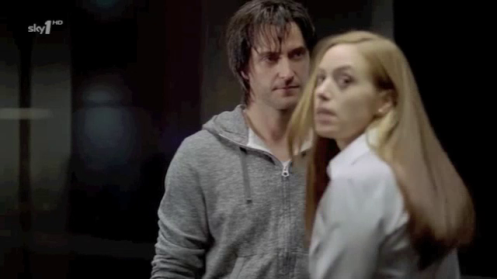
Porter (Richard Armitage) and Layla (Jodhi May), looking like nothing so much as siblings feuding, argue about access to Collinson in Strike Back 1.1.
***
We begin as Porter enters the Section 20 offices, where he must get past doorkeeper Layla (Jodhi May, cast here strongly against type). Note Porter’s posture as against Layla’s. I’ve written before about how the script and Armitage’s posture and head and eye motions function to involve women as the tools of his honor / dishonor conflict. At first, it looks like he’s standing in almost even status with her, but then, as our perspective changes, we can see that Porter drops his head to speak to Collinson. So the hierarchies of gender are reproduced.
***

Porter (Richard Armitage) lowers his head to look toward Collinson’s hand as Collinson (Andrew Lincoln) states that they are “old comrades,” in Strike Back 1.1.
***

Status negotiation — Porter (Richard Armitage), Layla (Jodhi May), and Collinson (Andrew Lincoln) as Collinson lets him into his office, in Strike Back 1.1.
***
Armitage makes a nice play here, using the sturdy, decisive Porter walk, but still managing to signal his unfamiliarity with the office, and hence his awkwardness, with a bit of a hitch in his gait at 0:14. The experienced soldier — between his dress and his walk, and his glance firmly trained on the floor — thus signals his lack of belonging in an office where everyone is much better dressed than he. He places his file of materials firmly on the desk, simultaneously asserting his authority and reassuring himself of his own case.
The conversation begins at 0:21, and Porter’s first glance at Collinson is once again not direct, but at best sidelong:
***
and even as Porter presses his case by accelerating his speech, his head is still lowered compared to Porter’s full normal standing posture:
***
In comparison, Collinson is able to stand at his assertive full height (albeit helped by the fact that Lincoln’s shorter than Armitage):
***
Porter continues the insistent buildup beginning at 0:35, but his head never comes up — rather, and interestingly, the more determined Porter becomes, the more he wants to assert his authority as someone who sees through the fog of the situation, the more willing he seem to be to lower his head, as at 0:41 —
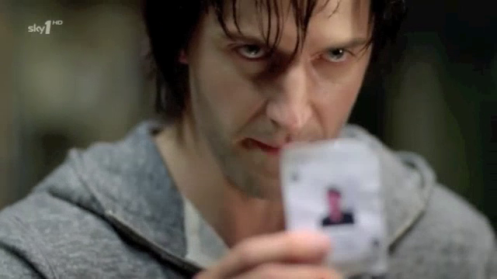
Porter (Richard Armitage) asserts that al-Naziri was at Basra the night of the Bratton extraction, in Strike Back 1.1.
***
At this point in the scene, the status game playing out here — Collinson’s superiority to Porter, and its outcomes for the potential realization of Porter’s wishes — serves to make Porter look even more strung out, ever more slightly unhinged, as the scene goes on, in part because Armitage asserts Porter’s authority from below.
“He was there!” an aggrieved Porter insists, and this is the highest Porter gets his head in the scene so far, almost maybe in the whole scene:
But watch Collinson’s supercilious, negating response, almost as if he’s saying, “don’t shout if you want me to listen to you” —
And immediately, in response, Porter — now caught in the impossible, irresolvable dilemma between asserting the truth of his hypothesis and being taken seriously by Collinson, lowers his head a touch:
Here, Armitage moves the energy of the scene forward by giving Porter an accelerating delivery of detailed data about al-Naziri, apparently in the attempt to assert that he has enough knowledge to speak on this issue. Not necessarily the strategy of persuasion that we’d expect from a soldier, and the subtly jittery feeling it generates underlines the extent to which Porter’s experiences have undermined his confidence, setting up a personality baseline that makes Porter’s move toward self-redemption (sorry, I can’t bring myself to call it atonement, I still think that was a huge script fail) in the remainder of the series both more believable and more inspiring. I also find myself wondering about his pronunciation of “Sunni.” Although this may be a British pronunciation of the term, for me anyway as an American who learned to use the long vowel, (whether intentionally or not) the short “u” tended to make it look, just like the rapid-fire data, as if Porter was trying to punch above his political and intellectual weight.
Porter pursues his case with more self-undermining moves, first via the pursed lips, a gesture he’s mimicking back at Collinson:
and then with his own personal tic, the “tongue of concentration,” which here makes Porter look simultaneously determined and nervous (and I assume comes from Armitage’s experience of Porter’s mood and not from his own conscious decision).
Collinson continues to resist, and Porter continues to insist, as Porter tells Collinson what he wants: to be brought to the safe house he’d seen last on that night, seven years ago. At 1:22, he begins to shake his head, and this is a really masterful choice, emphasizing both vehemence about his position and also disagreement with Collinson — but it’s a preemptive disagreement, as Porter already knows that Collinson will not give him what he wants. The shaking head thus also self-undermines; it signals not only conviction or tension but also Porter’s belief that he will not successfully sell his position to Collinson.
It’s fascinating here that as he tries to give Collinson steps in the direction of his plans, Porter lowers his head even more (as Collinson responds ever more negatively) …
… so that Porter’s head hits its lowest point as he becomes most assertive — when he yells, “Look!” Here Porter’s face takes on a fascinating quality in which he first expresses his rage …
… and I can’t resist noting that there’s nothing so wonderful in the Armitage repertoire as the seeing the anger cross his face from left to right, so that the left is angry even as the right remains in a sorrowful, aggrieved shadow — he looks on the left like he’s about to kill, on the right, as if he’s about to cry …
… and then backs off from the force of it by blinking in response to his own shout. (On the whole gender hierarchy issue, note that it’s just at this point that the camera decides to pull Layla back into the scene by showing us Porter’s back as he shouts, from her perspective.)
Of course, Collinson is still dismissive:
and so we see, at 1:33, a nervous swallow, and then a second later, the rapid-eye blink, a standard Richard Armitage move and here indicating his dual shame that he’s both failed to convince and lost his temper doing so:
Along with a jaw move and the shake of his head again, at 1:35, Armitage uses this gesture to slow the scene down, to deliver his last plea, a request tinged as much with weariness as anything else, a mood shown in Porter’s slack cheeks. As he knows that he’s failed to convince Collinson on the points of his case (and doesn’t see through Collinson at all, at this point), that he perhaps never had a chance, but that he still had to try — it would be interesting to compare this scene to Armitage’s performance in the proposal scene in North & South for just that reason — Porter has one card left: calling on Collinson’s sympathy for his needs.
“Just … let me find them,” Porter says, and now he’s not looking at Collinson at all, and the pitch of his voice is tending up, an Armitage emotionality signal, and a strong contrast to the shout of only a few moments earlier, the sudden shock of which is somewhat cushioned by the abject position of his head.
Every line that remains to Porter in this scene is delivered with his eyes positioned below his eyebrows. He opens them, as he repeats his plea:
and then closes them again, saying, “… and then you can send in the lads,”
and his bowed head and fluttering, then closed eyes together, along with the much-more-slowly shaking head, indicate the absolute loss of power. Porter can neither decide to go, get himself there, nor, once he’s there, actually carry out a mission. He is determined that he has to find them — and this determination defines the contours both of his shame and of his low status in the scene. He has no authority, but he’s willing to cede it even further to achieve his goal, if he can, even if his inability to participate in any such mission makes him think of everything he has lost, indeed, of his whole existence before the Bratton extraction. The grief on his face here provides a signature “inward look,” as if when Porter mentions the lads, he is also thinking of his dead comrades and of the permanently disabled Steve. He ends with a last, pleading glance up at 1:48.
Porter is able to lift his head again when he speaks of the theme of honor, the obligation that the child he saved stated to him in a phrase in a language he doesn’t understand and which Collinson originally had to translate for him. He does so with backed off energy that makes him seem simultaneously less powerful and more reasonable.
Here Porter’s looking as directly into Collinson’s gaze as he can, and asserting his importance: “No matter what he did to Mike and Keith and Steve, he owes me.” He’s realized he cannot yell to make his point, and also that the very low status plea has not succeeded, and so he comes back to honor, something which he somehow finds the resources to speak about with conviction, with a more convincing energy than he has shown up until now:
Porter thus asserts his essential role in any mission undertaken on this point. I am important, he seems to be saying, you have to take me along if you’re going to use this tool, no matter what you think of my idea or my apparent incapacity or my failure, all those years ago. Let my failure define me, then, he seems to signal, but you cannot get along without me.
When Collinson then insists that Porter’s ideas are “half baked,” the tone of Armitage’s voice rises again, and though he looks at Collinson eye to eye and man to man, his eyes are near closed again, almost as if in pain.
“I am not talking about revenge,” Porter gasps out, again as if he knows he will not be believed. And when Collinson rephrases the theme from revenge to atonement, Porter looks simultaneously relieved that he’s been understood — but also seen through — with a blink of his left eye, a barely perceptible quiver in his lip.
When Collinson makes his next statement, we know that he’s seen Porter’s inward look, and caught him. “This won’t bring them back,” he says, “John,” almost as a plea himself — and we know that Porter knows he’s been caught out in his impulses.
…and we sell the tell in the classic Armitage shame move, the chin down toward left motion.
When, however, Collinson notes that the expedition won’t bring his friends back but could send Porter to join them, the feeling that Armitage gives Porter, that his motives have been exposed, bores as clearly through those bangs as Porter glance up from below the eyebrows:
When Collinson accuses Porter of seeking death, we see the anger and abjection chiseled into his face. He’s been seen, unmasked — and yet not fully understood. The dawning realization on Porter’s face reveals more than just the frustration of being caught in a particular impulse, it’s also the first step (as we will see much later) in Porter’s recognition of just how aggressively Collinson will stand in the way of Porter’s search for answers (even if Porter himself can’t see that yet from this point in the plot).
Porter’s departure is thus a scramble, the papers as proof of his discredit case, all revealed as a search for vindication, all he has left.
Heavy-handed? Maybe, although I prefer to say that the show at least makes an attempt at being thoughtful, an attempt bolstered by Armitage’s subtle, many-faceted performance as a soldier who seeks not only vindication, or some kind of sacrifice for the trouble he believes he’s caused through his own failures, but also a self-redemption through the repeated (self-destructive) sacrifices he continues to make for others.
Porter shows his power through his abjection, his status through his subjection, his beauty through his ugliness. Like John Standring, Porter is strongest where he is weakest and most powerful in the places where he shows the greatest vulnerability.
Strike Back: Origins is airing Friday nights on Cinemaxx beginning tonight.

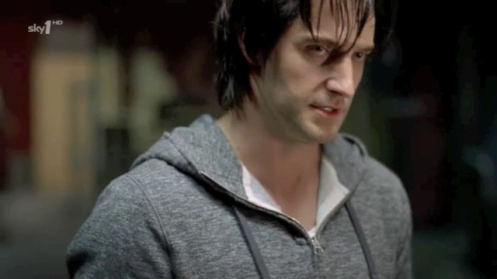

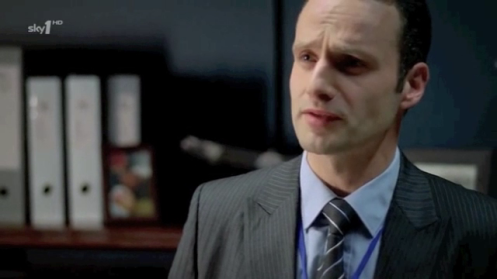



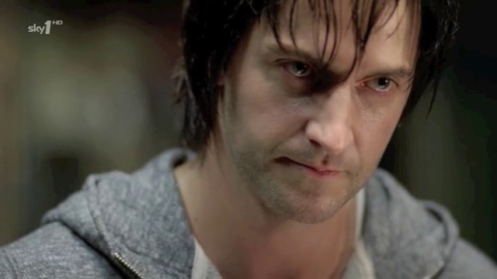

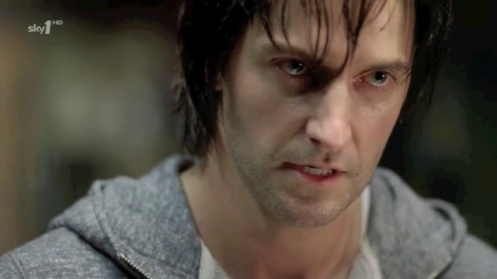
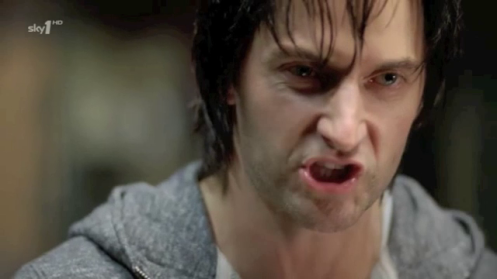

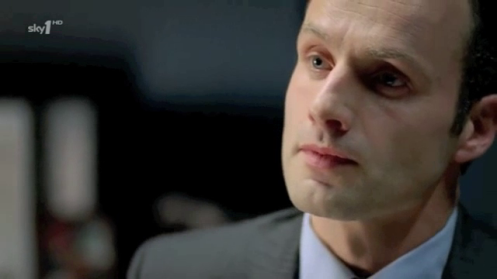


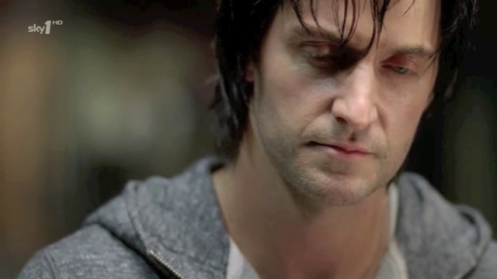


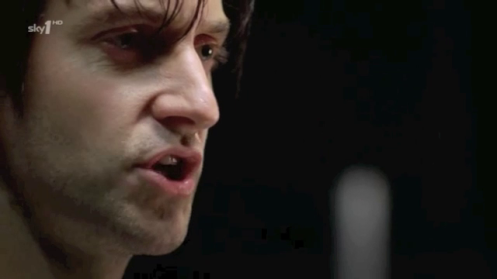
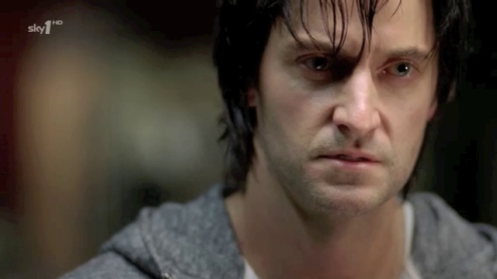


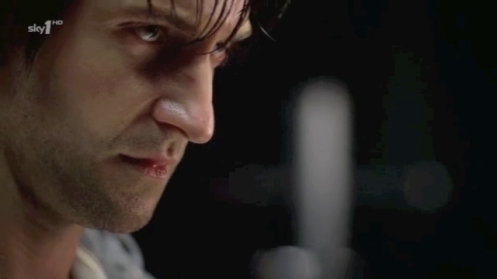
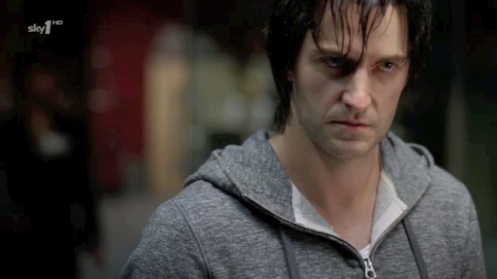




The things I don’t notice about JP are embarrassing. What an exceptional look at security guard Porter. Amazing.
LikeLike
I think part of what I am trying to get across is that his appearance is deceptively simply. He’s a solder, he’s supposed to be a guy, and he manages that, but the subtext is incredible.
LikeLike
Well said as usual, Serv. I ended up watching it twice and thinking about RA’s acting throughout and how much I appreciate what he brings to the role. And let it be said Andrew is good here, too–he’d mostly done comedy and lighter stuff before this and then Walking Dead. And yes, Jodhi, who has been excellent in so many costume dramas over the years, is definitely playing against type here. I would love to see more of her in contemporary roles (have you seen “Sister, My Sister” — disturbing but engrossing).
LikeLike
Lincoln: he’s really convincing in these scenes, I think, and in the Zimbabawe episodes. I’m less convinced by him in the final episode. I think he’s really good here at his portrayal of “I’m the smart, educated one and you’re the clueless soldier” — I find Lincoln less believable out in the desert, where he really is without protection — is he really that unperturbed about going out there, essentially to kill Porter or be killed?
LikeLike
This is great. Certainly one of my favorite scenes. (“Look!” gives me chills, every time) It was on twice…so I watched it twice. I am looking forward to hearing how it was received by what is probably a wider cable audience here in the States and a much different demographic than that of The Hobbit. Sorry to be short, but unfortunately, I must finish up some work and off to bed. Thanks for this!
LikeLike
Agree w/you re: “Look!” That is super-perceptive on Armitage’s part — the twinge of someone who’s been cautioned before for losing his temper and knows what it will get him.
LikeLike
If you are ever inclined, I would love to hear your take on the “I’d settle for an hour, and you can call me Romeo” scene.
LikeLike
I am pretty sure he actually says, “I’d settle for an ‘r’ and you can call me Romeo,” before Layla goes and spills the beans about Danni being used to relieve his sexual frustrations and boost his ego.
LikeLike
Really? Well that changes things, in terms of her response. Now I’m not sure what that means.
LikeLike
you know about military call letters, no?
LikeLike
Yeah, I should have commented about the military call signs. I learned them from spouse.
LikeLike
I don’t ever remember the ones at the end of the alphabet …
LikeLike
I don’t remember them as well, either. However, I DO remember stuff like this and “ROYGBIV” and “Kingdom phylum class order family genus species” much better than what I ate for lunch yesterday or where I laid my keys . . . *sigh*
LikeLike
Yes. Got it now.
LikeLike
R is actually Romeo in the NATO alphabet. So he’s saying, put me way down the list (but I did get someone in the sack)
http://www.osric.com/chris/phonetic.html
LikeLike
Yes, I’ve got the Alpha reference now. It’s now very obvious. The jump to the sex reference (in the script) feels now like a bit of a stretch, in terms of her quick response.
LikeLike
This is also a sort of remnant of the novel, compressed into a very small piece. The novel makes a big deal out of Danni’s seduction of Porter, spends like five or six pages on it. Then there’s a scene where Layla and Porter are waiting to fly and Layla spills the beans, and it turns into a somewhat longer confrontation. Most readers I’ve talked to felt that that section of the novel was completely implausible. I agree the line is strained, they’re trying to make Porter look like more of a wit than the character seems to be …
LikeLike
The series I really enjoyed – and am re-enjoying now after last night. Not sure if the novel would be my cup of tea. Spy novels, sure. War novels, not so much. Nothing against Mr. Ryan.
LikeLike
It was a scandal in the fandom when Armitage’s participation in SB was announced. That was a few months before I became a fan, and people were just horrified about the announcement, and then they went out and bought the book and read it. Severe horror. Things have loosened up a lot since then, but I read the book and can verify that it is really a horror.
LikeLike
I gotta confess I didn’t make it all the way through the book.
LikeLike
I read it 3-4 times. I always meant to blog about it and have a draft somewhere. Maybe now’s the time again, lol. It’s a horror. It has a couple of striking emotional moments, but the torture that Katie goes through is much, much worse than in the tv show; Porter’s behavior in general is less defensible; Alex’s role is a lot bigger and not especially believable; Layla is more of a jerk; Katie is a serious opportunist — it’s all so much more sensationalistic, almost a sort of parody of certain things. It might be hard for people to believe but the actual “Strike Back” is a work of art in comparison. Then again, maybe the audience for the new SB would have preferred more fidelity to the novel.
LikeLike
Also, Porter managed to make an almost miraculous turn-around after a much greater span of time out of the service, having morphed into a drunken, toothless, sickly homeless guy (I did make it that far in the book). I thought the way they shortened that span in the series and had Porter maintaining his training made the whole story more believable. You know, the new SB series actually does seem like a parody at times, what little I have watched of it, come to think of it. Yes, with all its faults, the original series’ teleplay was a big improvement over the source material (there is hope for 5O SoG, after all!).
LikeLike
That explains a lot. Seems to me I recall a few things he has said in the press a while back – about his initial discomfort with the portrayal of violence, the handling guns and alluding to some (fans?) not being happy. Paraphrasing, of course. I just didn’t think it was that much of an uproar. But I was not privy to it either. (Richarding, yes, but not chatting).
Funny, I haven’t seen him make such or like comments really anymore.
Re the violence in SB – I do know this: my mother also likes Richard’s work, but she will not watch SBO because of what happens to Katie.
LikeLike
it took place on the boards, so you could read it about it if you wanted to. That was several months before the appearance of the original generation of blogs, even. There was this funny thing where people said they needed to read the novel with a red pen the prose was so bad (and they were not wrong, it was really poorly edited. I’ve read better written fanfic).
LikeLike
That’s a shame. Good thing the show producers found better writers then – or, “fixers”.
On that note: I have to go fix myself, before I wreck myself…financially.
LikeLike
Did you get my response? If not, I will try later.
LikeLike
Yet another example of “bestseller” not necessarily equaling “well-written book” (EL James . . . where are you??). And it seems to me editing of books in general is becoming more and more sloppy. It’s distressing. I’ve given up reading some stuff with a promising storyline and interesting characters because it was just so badly constructed.
LikeLike
It ties in with Layla’s comments about the rest of the soldiers being the “alpha” team on this mission to rescue Katie and Porter only being back up, or the “b” team. So he quips about getting “r” and Romeo because he is indirectly bragging a little, I suppose, after his encounter with the lovely Danni.
LikeLike
Sorry FL! I hadn’t read your comments above when I posted mine. I guess we are on the same wavelength though!! 😉
LikeLike
LOL I think we all were on the same wavelength at the same time here. Of course, in my version of the story, Layla is secretly a bit jealous of Danni and fighting an attraction to Portah—so she can’t resist bursting the poor guy’s bubble
LikeLike
I rather like that idea! Actually i think she did have a bit of a soft spot for him in the end. How could she *not* be attracted by John Porter? 🙂
LikeLike
She definitely ended up on Team Portah. And aren’t we glad?
LikeLike
IIRC he actually says “I’d settle for an R and you can call me Romeo”. He’d been told he was to be B team and Layla said somewhat dismissively that he was lucky to be that far up the alphabet. He, of course, is referring to his “encounter” with Danni!! 😉
LikeLike
I’ll put it on the list of possibles, crystal — there are some fun microexpressions there.
LikeLike
It’s up to you. 🙂
LikeLike
Alpha = A team = first choice
Bravo = B team = second choice
he says, so I’m B team
she says, you’re lucky you’re that close
his comeback is give me “R” — much lower in alphabet, but he’s bragging about his exploits
LikeLike
I have an issue with the wig, aside from the fact that it is wiggy in the extreme. I don’t think they needed it to emphasize how far JP has fallen, from spit and polish to slovenly. There and back again (hot, then not, then hot again). I loved the details you pointed out regarding how he used it to look through, almost like a veil, and his use of ugliness as a dramatic tool. I think his facial expressions are enough to convey his fall without the fright wig. No matter how deep the depths into which he has sunk, would he go into the situation with his greasy hair hanging in his face to plead his case? It makes him look irrational and out of control, a person not be taken seriously. I don’t mean he had to get haircut, just run a comb through it. I just had to get that off my chest, it always bothered me. He is stressed out, I get it, and he has rushed there in his sweats, but the horrible hair is overkill. And thanks again for sharing your insights, great as usual.
LikeLike
Yeah, I think the wig was overkill, too. Richard, as always, made the most of what was thrown at him, but he could have done just fine without the dodgy fake hair.
LikeLike
I always hated that wig too. I found it completely unnecessary, over the top and ridiculous in light of how physically fit he was keeping himself.
LikeLike
I assume that there’s some continuity issue at work — i.e., that they filmed these scenes in the midst of other ones where he had to have short hair / the very trim military haircut (although, interestingly, I learned when I researched this, British soldiers don’t have the very limited/stringent required haircut like American ones do; haircuts are mandated by regiment). So they needed him to have longer hair intermittently. I agree this was overkill. It was also hard for me to believe that MI-6 would have their security guards looking like that.
LikeLike
I always hated that wig and just felt that it took away from the scene. He just looks ridiculous and I think the color was off. Is his hair a very, very dark brown or black? Sadly and embarrassingly I can’t decide. But I don’t think it did anything for him in that scene.
LikeLike
agree that it makes him look weird and that they could have done better.
LikeLike
About the use of status in his acting, is this something that’s always at work when he’s in a scene with one or more other actors? I wish there were similar analayses of other actors so we could compare and contrast. If this is something learned in drama school , (he said showing status was when he described his first scene with Ian McKellen,) then wouldn’t most decent actors be attempting it using body language?
LikeLike
Yes, all actors use status (if you read the original status post, linked above you’ll see I describe friends of mine in college doing status homework / exercises in the first semester of acting). I think he’s particularly good at it (what I call a “status expert” in that post) but I have never asserted here or elsewhere that no one else does it. Status demonstration is also only as good as the other people in the scene, and Lincoln is really effective here, but as Armitage noted in his comment re: McKellen, actors give each other status. His capacity to do this well may have something to do with the interest he used to state in being a one man show and his preference for ensemble casts.
LikeLike
oh, and subsidiary point — humans do it too. Not just actors. Recreating status is a technique of presenting verisimilitude. Hence the exercise of watching people from afar and trying to discern status without knowing what’s being said.
LikeLike
Thanks for that. By the way, concerning the pronounciation of *sunni* it’s odd to me. Both Collinson and Layla use a long *u* so apparently Armitage’s mispronunciation was intentional. He must know the right pronunciation, and if he didn’t the director or editors should have caught it. Still, John Porter should have known the right pronunciation under the circumstances – since he had been following news reports over the years concerning matters in a region where conflicts between the sects was part of the problems.
LikeLike
it sounds like the “I’ve read about it a lot but don’t talk about it most of the time problem” — maybe I’m reading it that way because it was a common problem I had as a child and I see it in my nieces — reading words you don’t know how to pronounce. Still, if Porter’s watching the news, he should know …
LikeLike
I watched the DVD of this episode last night and wondered if perhaps his “Northern” accent came into play at that moment making it only sound like a short “u” even though it was meant to sound longer 🙂 Just a thought!
LikeLike
One thing that’s odd is that that’s not one of the scenes where the “northern” accent is especially in evidence.
LikeLike
I know! 🙂 It made me wonder if that is how RL RA would say it!! 😀
LikeLike
The point of looking at anything from a vantage point (anlyzing someting via status, or gender, or a few other themes in his acting) is that draws out particular moments for our consideration — as people say, we see more / differently. It’s like an infrared filter, if you will.
LikeLike
Great analysis as usual, Servetus. So many things I haven’t noticed before reading it. Thank you so much!
LikeLike
🙂 🙂
LikeLike
Yes, seeing him in the parking area and seeing how he looked and moved was really moving. That glimpse there said it all and then to see that hair when he was in the office and how truly ugly they’d made him…. Collinson couldn’t afford to let him have his plan of course but then was forced into it. We all know where it is going though first time watchers don’t. What you see is man who has lost it all. He still trains certainly but outside of that he does nothing. His wife is gone, his daughter won’t talk to him. He believes he is responsible for the deaths of comrades and the crippling of his best friend. The only honor he knew is gone and you see it all in his face and body. He is a truly desperate man. Now they did change that look rather fast I thought. He went from that slovenly man to the beautiful man we all know in a second but of course they don’t specify the training time there. Look at how different he became just putting that uniform back on. Didn’t look like he needed a confidence booster did he? Thing is they brought him along but they still didn’t want to listen to him did they and it cost Katie. In the beginning he is certainly showing his lack of status and how far he has fallen and by the end of the show he has pulled himself up quite a lot. He knows what he has to do and they seem to be ignoring him. I’ll have to watch the episode again I think as everyone else has to pick up more.
LikeLike
In the book, Porter is homeless and they scoop him off the street, repair his whole body, and put him on a plane two days later. Armitage remarked in pre-publicity that that was rewritten both because it was not plausible and because they didn’t want to show him as “Rocky Balboa,” so they had him training to be essentially fit before he was reactivated. The idea is that all he needs in the series is a hiarcut to look military again.
I think the point of the uniform is that those are the close he feels he belongs in — though he doesn’t articulate it in the show, the whole vibe of the show (and the things Armitage said in interviews about it) is that the military is the only thing he ever considered or wanted. So in a way, any other clothes he wears look bad because he’s uncomfortable in them, he’s only comfortable in the military uniform.
LikeLike
I must confess that I have never read such a detailed analysis of a scene and so accurate – I deduced some things while watching for the second time, but not at this level. You would make a good film critic. There are some specific Armitage mannerisms that I recognize from his solid body of work, yes, Standring, and Thornton, too; others have just become clear to me, thank you for that!
LikeLike
Thanks — I know I got out of the habit of writing these the last year or so while things were so terrible, but there are going to be more again now. Glad you liked it.
LikeLike
You are right Mairimia. Serv really hits the mark and would be a fantastic reviewer. They don’t want that unfortunately but she really nails it all with how he stands, walks, and how his face is used to work the scene. She even gets how the camera is used on the other actors to work the scene itself. It is beautifully done and you know reviewers don’t even talk about status and what it means. Viewers may see it and not even recognize what they are seeing but understanding the nuances can bring so much more to the viewing itself.
LikeLike
What I do in this kind of post isn’t what film criticism is supposed to accomplish. This is more sort of a lecture about what to watch for — notes on a performance, I suppose, like the director gives after a rehearsal.
LikeLike
I love your analytical posts, missed them. 🙂
LikeLike
🙂 🙂 🙂
LikeLike
[…] wanted to follow last week’s analysis of Richard Armitage’s performance of John Porter in the first serie…, and just spooled quickly through the second episode of the series. There’s a lot here I […]
LikeLike
Richard Armitage + John Porter status games: More from Strike Back: Origins | Me + Richard Armitage said this on November 1, 2013 at 6:40 am |
[…] execution of status games with Hugh Collinson, arguing that Armitage subtly turns over the subordinate position status dynamic of his character in Origins 1.1 via his use of physical and gestural language in […]
LikeLike
Richard Armitage + John Porter status games, or: Waiting makes it better | Me + Richard Armitage said this on November 9, 2013 at 8:16 am |
[…] the man who ended his career and in consequence, seriously disrupted his life. In episode 1, Porter ended up one down, but used the same body language in episode 2 to move up. In episode 3, we again saw Porter toying […]
LikeLike
Richard Armitage + John Porter status games in Strike Back: Origins 1.4 & 1.5 | Me + Richard Armitage said this on November 25, 2013 at 3:51 am |
[…] none of the facially revealed introspection that Armitage uses in some of his other characters (John Porter, for instance). We don’t immediately read shame because Thorin never has that look of guilt […]
LikeLike
[SPOILERS] The Desolation of Smaug, closer look at Richard Armitage’s performance [second impressions] | Me + Richard Armitage said this on December 15, 2013 at 5:12 am |
[…] we see the gradually intensifying introspective look that Armitage would later edit down for characters lik…, in an almost slow-motion version. Part of that, I suppose, can be attributed to differences in the […]
LikeLike
Is John Standring forever? An early ugly Armitage | Me + Richard Armitage said this on February 3, 2014 at 6:28 am |
[…] he accomplishes this over and over again, as with Mr. Thornton, with Guy of Gisborne, with John Porter, with Thorin Oakenshield. So I submit — one reason that Armitagemania happened to me was to […]
LikeLike
Keep your shame, I’ve got my own | Me + Richard Armitage said this on April 8, 2014 at 4:27 am |
[…] his acting, when he shows shame or abasement. A series on how he used this move with Porter starts here; or here’s a discussion of Thorin in one scene from An Unexpected Journey; I’ve written […]
LikeLike
2015 continued (part 3): me + richard armitage + Cybersmile | Me + Richard Armitage said this on March 22, 2016 at 6:33 am |
[…] more. I could also add to this themes in acting and emotional psychology, like micro-expressions, status games, […]
LikeLike
Finneganbeginagain | Me + Richard Armitage said this on September 10, 2021 at 4:42 am |